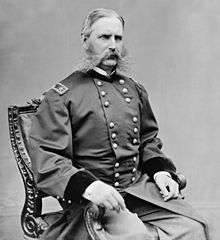Christopher C. Augur
| Christopher Columbus Augur | |
|---|---|
|
Christopher C. Augur | |
| Born |
July 10, 1821 Kendall, New York |
| Died |
January 16, 1898 (aged 76) Georgetown, Washington, D.C. |
| Place of burial | Arlington National Cemetery |
| Allegiance |
United States of America Union |
| Service/branch |
United States Army Union Army |
| Years of service | 1843–1885 |
| Rank |
|
| Unit |
4th U.S. Infantry 13th U.S. Infantry |
| Commands held |
Eastern Iron Brigade 2nd Division, II Corps XXII Corps Department of Washington Department of the Missouri 12th U.S. Infantry |
| Battles/wars |
Yakima War Rogue River Wars Mexican-American War American Civil War |
Christopher Columbus Augur (July 10, 1821 – January 16, 1898) was an American military officer, most noted for his role in the American Civil War. Although less well known than other Union commanders, he was nonetheless considered an able battlefield commander.
Early life
Augur was born in Kendall, New York. He moved with his family to Michigan and entered West Point in 1839.[1] Following his graduation in 1843, Augur served as aide-de-camp to Generals Hopping and Cushing during the Mexican-American War, and during the 1850s took an active part in the campaigns of the western frontier against the Yakima and Rogue River tribes of Washington and, in 1856, against the Oregon Indians. In Oregon, he was responsible for building Fort Hoskins in Kings Valley.[2]
Civil War
Upon the outbreak of the Civil War, Augur served as commandant of cadets at West Point.[1]
Appointed brigadier general of volunteers in 1861, he commanded a brigade under Irvin McDowell during the early part of the war. He was severely wounded at Cedar Mountain in August 1862 while leading a division under Maj. Gen. Nathaniel Banks. He was appointed major general by President Abraham Lincoln on November 14, 1862, to rank from August 9, 1862. President Lincoln had to submit the nomination three times before the U.S. Senate finally confirmed the appointment on March 10, 1863.[3]
Subsequently, Augur commanded a division in the Army of the Gulf during the siege of Port Hudson. He commanded the XXII Corps and the Department of Washington (1863–66), ending the war with an exemplary record. He was present when President Abraham Lincoln succumbed to an assassin's bullet, and was detailed to escort the President's body from the Petersen House, where the President died, on to the White House.
Postbellum career
Following the war, Augur also would command the departments of the Platte (1867–71), of Texas (1871–75, 1881-83), of the Gulf (1875–78), and of the South (1878-80). He headed up the Military Division of the Missouri from 1883-85. He also played a major role in negotiations of the Treaties of Medicine Lodge in 1867 and Fort Laramie in 1868. A fort in the Wyoming Territory was briefly named Fort Augur in his honor. In 1885, he retired from the Army with the rank of brigadier general.[4]
He was a member of the Aztec Club of 1847, the Military Order of the Loyal Legion of the United States and the Military Order of Foreign Wars.
Augur died in Georgetown, Washington, D.C. on January 16, 1898,[1] and is buried in Arlington National Cemetery.
See also
Notes
- 1 2 3 Who Was Who in American History - the Military. Chicago: Marquis Who's Who. 1975. p. 19. ISBN 0837932017.
- ↑ Corning, Howard M. (1989) Dictionary of Oregon History. Binfords & Mort Publishing. p. 15.
- ↑ Eicher, John H., and Eicher, David J., Civil War High Commands, Stanford University Press, 2001, ISBN 0-8047-3641-3. p. 702
- ↑ Eicher, 2001, p. 109
- Bibliography
 This article incorporates text from a publication now in the public domain: Gilman, D. C.; Thurston, H. T.; Colby, F. M., eds. (1905). "article name needed". New International Encyclopedia (1st ed.). New York: Dodd, Mead.
This article incorporates text from a publication now in the public domain: Gilman, D. C.; Thurston, H. T.; Colby, F. M., eds. (1905). "article name needed". New International Encyclopedia (1st ed.). New York: Dodd, Mead.
- Augur, E.P. The Augur Family. Middletown, Connecticut, 1904.
- Eicher, John H., and Eicher, David J., Civil War High Commands, Stanford University Press, 2001, ISBN 0-8047-3641-3.
- Keenan, Jerry. Encyclopedia of American Indian Wars, ABC-CLIO, Inc.: California, 1997. ISBN 0-87436-796-4
- Who Was Who in American History - the Military. Chicago: Marquis Who's Who. 1975. ISBN 0837932017.
External links
| Wikimedia Commons has media related to Christopher C. Augur. |
- Christopher Columbus Augur from the Handbook of Texas Online
- Arlington National Cemetery biography
- "Christopher C. Augur". Find a Grave. Retrieved 2008-02-12.
- Christopher C. Augur Papers at Newberry Library
- Christopher C. Augur Collection of Photographs of the Western United States at Newberry Library
